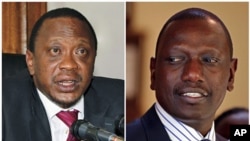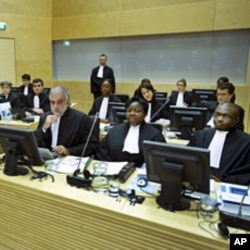The Kenyan government has put together a team of 10 lawyers to advise it on how to respond to Monday's ruling by the International Criminal Court. The court said four prominent Kenyans - including the deputy prime minister - must stand trial for alleged crimes against humanity. There is also talk of setting up a structure in Kenya's judicial system to deal with other Kenyans accused of roles in the country's 2007-2008 post-election violence.
Attorney General Githu Muigai hinted that the Kenyan government may consider challenging the International Criminal Court rulings on the grounds that the ICC action impinges upon Kenya’s sovereignty.
Muigai referred to an application his government filed to the ICC last March - and a subsequent appeal - challenging the admissibility of the cases, arguing that Kenya has the primary responsibility, and ability, to deal with criminal matters.
Under the Rome Statute, the treaty that created the International Criminal Court, states can challenge admissibility and jurisdiction.
“The issues remain alive in terms of the provisions of the Rome Statue, and the government of Kenya will be taking legal counsel on the question of whether those issues are to be pursued further or not,” said Muigai.
He also said that the four suspects - three of whom are high-profile government members - are being represented in their private capacity and that, in his words, “the government cannot speak on their behalf as to what they will do or not do.”
Muigai’s comments come a day after The Hague-based court ruled that crimes against humanity cases will proceed for Deputy Prime Minister and finance minister Uhuru Kenyatta, former agriculture and higher education minister William Ruto, civil service head Francis Muthaura, and radio presenter Joshua Sang.
Kenyatta and Ruto are presidential candidates in the upcoming elections, to be held before March of next year.
Two other suspects - postmaster general and former police commissioner Mohammed Hussein Ali and suspended industrialization minister Henry Kosgey - had their cases dismissed.
Muigai said all four remaining suspects will appeal the ICC’s ruling.
In a press conference at The Hague, ICC chief prosecutor Luis Moreno-Ocampo said that the Kenyan government has the right to challenge the court.
“However, in the challenge of admissibility you have to prove, first, the case in Kenya is again the same people for the same incident, for the same crimes, and additionally you have to prove it is a genuine case,” Ocampo said.
This means that the ICC has to be convinced that Kenya has the appropriate legal structures, ability, desire, and integrity to try the same suspects for the same charges.
Attorney General Muigai Monday said he has asked for a meeting with Kenya's Judicial Service Commission to create a special High Court division that would deal exclusively with post-election violence cases.
And, government officials have argued that Kenya’s new constitution expands the country’s capacity to try post-election violence suspects.
But one source at the Law Society of Kenya said these structures would need to be in place and fully operational long before the challenge is launched, not as a response to the ruling.
In late 2007 and early 2008, the country erupted in ethnic violence following the bitterly-disputed 2007 presidential poll. More than 300,000 people were displaced in the violence, and some 1,300 others killed.
With the help of mediator and former U.N. chief Kofi Annan, presidential rivals Mwai Kibaki and Ralia Odinga forged a power-sharing government that has held together despite recurring tensions. Mr. Odinga has also declared that he will run for president in the upcoming elections.





